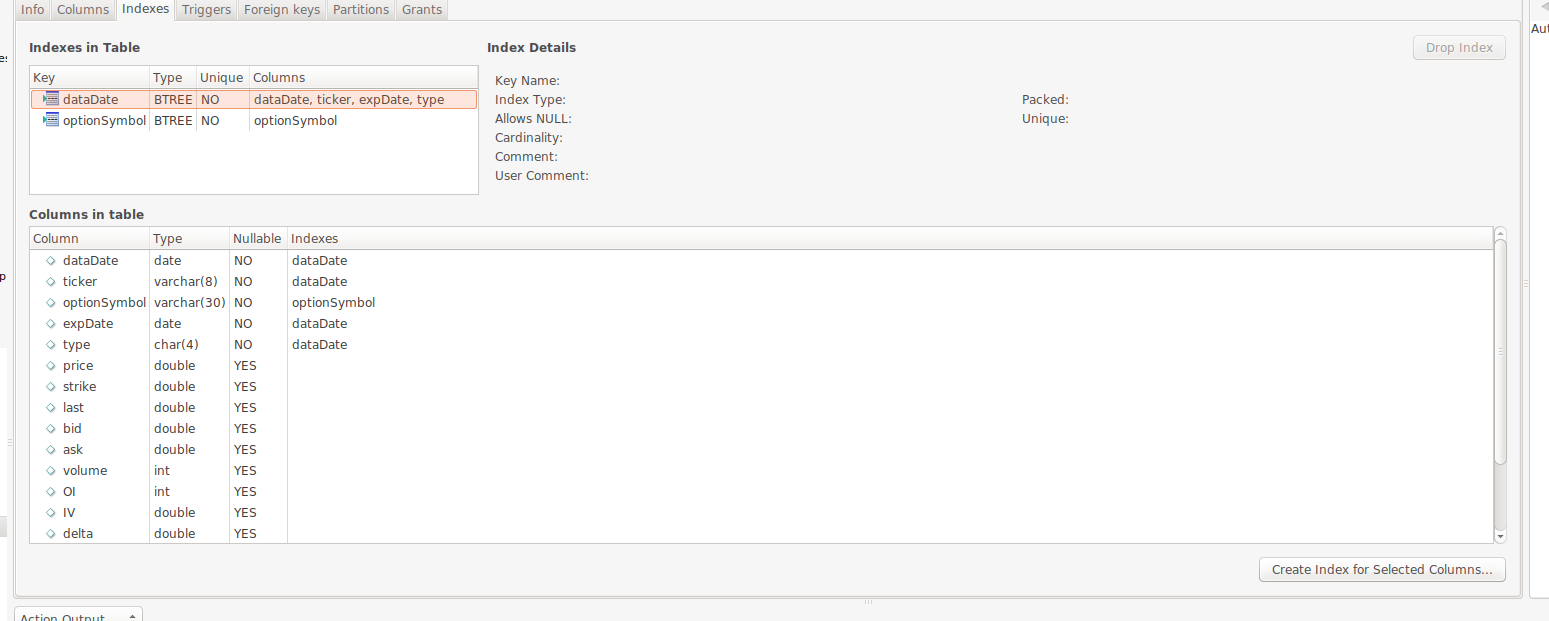I'm looking to do a relatively simply filter from one table called prices.
prices is a very large table (~2G records). Sample data, query and indexes included below. I realize the table being queried is very large, but for a query this simple I would have expected better performance (currently ~5 mins and running). I did notice InnoDB Buffer Usage appears to be at 100% per MySQL Workbench, with ~6K InnoDB reads per second. Guidance on adjustments to make to correct this.
prices
dataDate ticker optionSymbol expDate type price strike last bid ask volume OI
2002-02-08 AAPL AAQ020216C00005000 2002-02-16 call 24.03 5 0 18.8 19.1 0 0
2002-02-08 AAPL AAQ020216P00005000 2002-02-16 put 24.03 5 0 0 0.05 0 0
2002-02-08 AAPL AAQ020216C00007500 2002-02-16 call 24.03 7.5 0 16.3 16.6 0 0
2002-02-08 AAPL AAQ020216P00007500 2002-02-16 put 24.03 7.5 0 0 0.05 0 0
2002-02-08 AAPL AAQ020216C00010000 2002-02-16 call 24.03 10 12.2 13.9 14.2 0 1
2002-02-08 AAPL AAQ020216P00010000 2002-02-16 put 24.03 10 0 0 0.05 0 0
2002-02-08 AAPL AAQ020216C00012500 2002-02-16 call 24.03 12.5 13.5 11.4 11.7 0 8
2002-02-08 AAPL AAQ020216P00012500 2002-02-16 put 24.03 12.5 0.05 0 0.05 0 50
2002-02-08 AAPL AAQ020216C00015000 2002-02-16 call 24.03 15 7.1 8.9 9.1 0 10
2002-02-08 AAPL AAQ020216P00015000 2002-02-16 put 24.03 15 0.1 0 0.05 0 30
2002-02-08 AAPL AAQ020216C00017500 2002-02-16 call 24.03 17.5 5.5 6.4 6.7 0 371
2002-02-08 AAPL AAQ020216P00017500 2002-02-16 put 24.03 17.5 0.05 0 0.05 0 147
2002-02-08 AAPL AAQ020216C00020000 2002-02-16 call 24.03 20 3.9 3.9 4.1 7 1064
2002-02-08 AAPL AAQ020216P00020000 2002-02-16 put 24.03 20 0.1 0 0.1 5 1448
2002-02-08 AAPL AAQ020216C00022500 2002-02-16 call 24.03 22.5 1.7 1.7 1.75 1551 7069
2002-02-08 AAPL AAQ020216P00022500 2002-02-16 put 24.03 22.5 0.2 0.15 0.25 136 3234
2002-02-08 AAPL AAQ020216C00025000 2002-02-16 call 24.03 25 0.3 0.1 0.35 105 4237
2002-02-08 AAPL AAQ020216P00025000 2002-02-16 put 24.03 25 1.25 1.2 1.35 629 589
2002-02-08 AAPL AAQ020216C00027500 2002-02-16 call 24.03 27.5 0.05 0 0.1 0 1097
Query
select *
from op.prices op
where ticker = 'AAPL'
and '2020-04-30' between date_add(expDate, INTERVAL 3 MONTH) and expDate
and '2020-04-30' = date_add(op.dataDate, INTERVAL 14 DAY);


WHEREstatement to justdataDate = '2020-04-16' AND ticker = 'AAPL'date_addthat I don't?